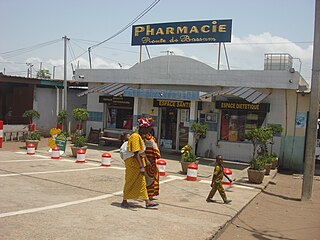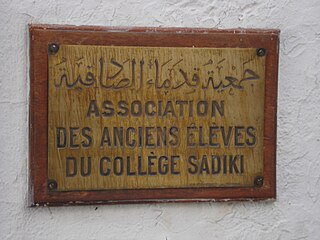
Algeria, officially the People's Democratic Republic of Algeria, is a country in North Africa. Algeria is bordered to the northeast by Tunisia; to the east by Libya; to the southeast by Niger; to the southwest by Mali, Mauritania, and Western Sahara; to the west by Morocco; and to the north by the Mediterranean Sea. It is considered part of the Maghreb region of North Africa. It has a semi-arid climate, with most of the population living in the fertile north and the Sahara dominating the geography of the south. Algeria covers an area of 2,381,741 square kilometres (919,595 sq mi), making it the world's tenth largest nation by area, and the largest nation in Africa, more than 200 times as large as the continent's smallest country, The Gambia. With a population of 44 million, Algeria is the tenth-most populous country in Africa, and the 32nd-most populous country in the world. The capital and largest city is Algiers, located in the far north on the Mediterranean coast.

The Berber languages, also known as the Amazigh languages or Tamazight, are a branch of the Afroasiatic language family. They comprise a group of closely related but mostly mutually unintelligible languages spoken by Berber communities, who are indigenous to North Africa. The languages are primarily spoken and not typically written. Historically, they have been written with the ancient Libyco-Berber script, which now exists in the form of Tifinagh. Today, they may also be written in the Berber Latin alphabet or the Arabic script, with Latin being the most pervasive.

Demographic features of the population of Algeria include population density, ethnicity, education level, health of the populace, economic status, religious affiliations and other aspects.
Zenaga is a Berber language on the verge of extinction currently spoken in Mauritania and northern Senegal by a few hundred people. Zenaga Berber is spoken as a mother tongue from the town of Mederdra in southwestern Mauritania to the Atlantic coast and in northern Senegal. The language is recognized by the Mauritanian government.

Kabyle or Kabylian is a Berber language (tamazight) spoken by the Kabyle people in the north and northeast of Algeria. It is spoken primarily in Kabylia, east of the capital Algiers and in Algiers itself, but also by various groups near Blida, such as the Beni Salah and Beni Bou Yaqob.

African French is the generic name of the varieties of the French language spoken by an estimated 167 million people in Africa in 2023 or 51% of the French-speaking population of the world spread across 34 countries and territories. This includes those who speak French as a first or second language in these 34 African countries and territories, but it does not include French speakers living in other African countries. Africa is thus the continent with the most French speakers in the world, and African French speakers now form a large and integral part of the Francophonie.

The official languages of Algeria are Arabic and Tamazight (Berber), as specified in its constitution since 1963 for the former and since 2016 for the latter. Berber has been recognized as a "national language" by constitutional amendment since 8 May 2002. In February, 2016, a constitutional resolution was passed making Berber an official language alongside Arabic. Algerian Arabic and Berber are the native languages of over 99% of Algerians, with Algerian Arabic spoken by about 90% and Berber by 10%. French, though it has no official status, is still used in media and education. due to Algeria's colonial history. Kabyle, the most spoken Berber language in the country, is taught and partially co-official in parts of Kabylie.

Tunisian Arabic, or simply Tunisian, is a variety of Arabic spoken in Tunisia. It is known among its 12 million speakers as Tūnsi, "Tunisian" or Derja to distinguish it from Modern Standard Arabic, the official language of Tunisia. Tunisian Arabic is mostly similar to eastern Algerian Arabic and western Libyan Arabic.

Egyptians speak a continuum of dialects. The predominant dialect in Egypt is Egyptian Colloquial Arabic or Masri/Masry, which is the vernacular language. Literary Arabic is the official language and the most widely written. The Coptic language is used primarily by Egyptian Copts and it is the liturgical language of Coptic Christianity.
Education in Algeria is free and compulsory for Algerians from the ages of 6 to 15. However, only half of Algerian students are enrolled in secondary schools. As of 2015, Algeria has 92 post-secondary institutions, which includes 48 universities.

Chadian Arabic, also known as Shuwa Arabic, Western Sudanic Arabic, or West Sudanic Arabic (WSA), is a variety of Arabic and the first language of 1.6 million people, both town dwellers and nomadic cattle herders. Most of its speakers live in central and southern Chad. Its range is an east-to-west oval in the Sahel. Nearly all of this territory is within Chad and Sudan. It is also spoken elsewhere in the vicinity of Lake Chad in the countries of Cameroon, Nigeria and Niger. Finally, it is spoken in slivers of the Central African Republic. In addition, this language serves as a lingua franca in much of the region. In most of its range, it is one of several local languages and often not among the major ones.
Kouloughlis, also spelled Koulouglis, Cologhlis and Qulaughlis, but the translation of the word "kul" as slave is misleading since in the Ottoman context, it referred to one's special status as being in the special service of the sultan. It was a term used during the period of Ottoman influence in North Africa that usually designated the mixed offspring of Ottoman officials and janissaries, and local North African women.
A world language is a language that is geographically widespread and makes it possible for members of different language communities to communicate. The term may also be used to refer to constructed international auxiliary languages such as Esperanto.

There are a number of languages in Morocco. De jure, the two official languages are Standard Arabic and Standard Moroccan Berber. Moroccan Arabic is by far the primary spoken vernacular and lingua franca, whereas Berber languages serve as vernaculars for significant portions of the country. The languages of prestige in Morocco are Arabic in its Classical and Modern Standard Forms and sometimes French, the latter of which serves as a second language for approximately 33% of Moroccans. According to a 2000–2002 survey done by Moha Ennaji, author of Multilingualism, Cultural Identity, and Education in Morocco, "there is a general agreement that Standard Arabic, Moroccan Arabic, and Berber are the national languages." Ennaji also concluded "This survey confirms the idea that multilingualism in Morocco is a vivid sociolinguistic phenomenon, which is favored by many people."

Benin is a diverse country linguistically. Of those, French is the official language, and most of the indigenous languages are considered national languages.

The official languages of the Central African Republic are French and Sango. In total there are about 72 languages in the country.

The languages of Mauritania include the official language, Arabic, three national languages, Pular, Soninke and Wolof, and French, a former official language which is still the language of working language, education and administration.

Of the languages of Tunisia, Arabic is the sole official language according to the Tunisian Constitution.

Arab-Berbers are a population of the Maghreb, a vast region of North Africa in the western part of the Arab world along the Mediterranean Sea and the Atlantic Ocean. Arab-Berbers are people of mixed Arab and Berber origin, most of whom speak a variant of Maghrebi Arabic as their native language, some also speak various Berber languages. Many Arab-Berbers identify primarily as Arab and secondarily as Berber.

The French language became an international language in the Middle Ages, when the power of the Kingdom of France made it the second international language, alongside Latin. This status continued to grow into the 18th century, by which time French was the language of European diplomacy and international relations.















